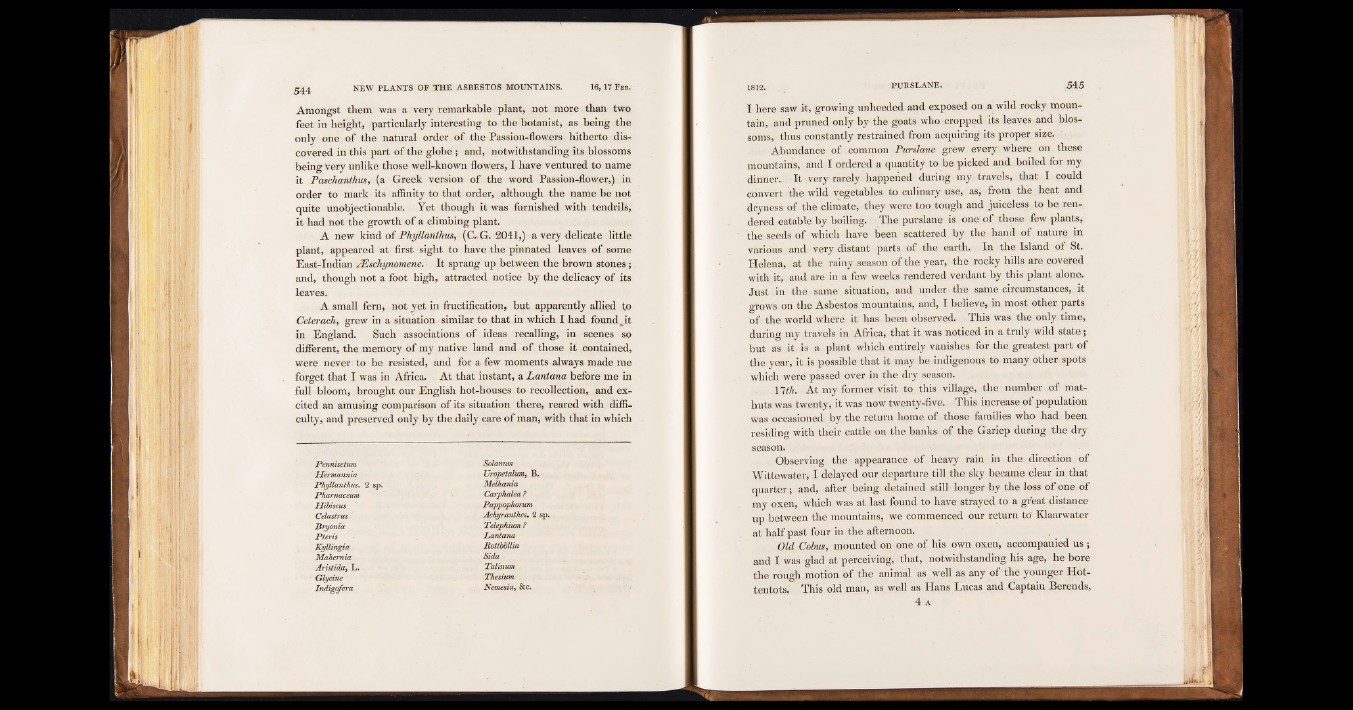
Amongst them was a very remarkable plant, not more than two
feet in height, particularly interesting to the botanist, as being the
only one of the natural order of the Passion-flowers hitherto discovered
in this part of the globe ; and, notwithstanding its blossoms
being very unlike those well-known flowers, I have ventured to name
it Paschanthus, (a Greek version of the word Passion-flower,) in
order to mark its affinity to that order, although the name be not
quite unobjectionable. Yet though it was furnished with tendrils,
it had not the growth of a climbing plant.
A new kind of Phyllanthus, (C- G. 2041,) a very delicate little
plant, appeared at first sight to have the pinnated leaves of some
East-Indian ¿Eschyiwmene. It sprang up between the brown stones;
and, though not a foot high, attracted notice by the delicacy of its
leaves.
A small fern, not yet in fructification, but apparently allied to
Ceterach, grew in a situation similar to that in which I had foundjt
in England. Such associations of ideas recalling, in scenes so
different, the memory of my native land and of those it contained,
were never to be resisted, and for a few moments always made me
forget that I was in Africa. At that instant, a Lantana before me in
full bloom, brought our English hot-houses to recollection, and excited
an amusing comparison of its situation there, reared with difficulty,
and preserved only by the daily care of man, with that in which
Pennisetum
Hermannia
PhyUanihus. 2 sp.
Pharnaceum
Hibiscus
Celastrus-
Bryonia
Pteris
Kyllingia
Mahemia
Aristida, L.
Glycine
Indigofera
Solanum
Uropetalum, B. •
Melhania
Carphalea ?
Pappophorum
Achyranthes. 2 sp.
Telephium ?
Lantana
Botibollia
Sida
Talinum
Ihesium
Nemesia, &c.
I here saw it, growing unheeded and exposed on a wild rocky mountain,
and pruned only by the goats who cropped its leaves and blossoms,
thus constantly restrained from acquiring its proper size.
Abundance of common Purslane grew every where on these
mountains, and I ordered a quantity to be picked and boiled for my
dinner. It very rarely happened during my travels, that* I could
convert the wild vegetables to culinary use, as, from the heat and
dryness of the climate, they were too tough and juiceless to be rendered
eatable by boiling. The purslane is one of those few plants,
the seeds of which have been scattered by the hand of nature in
various and very distant parts of the earth. In the Island of St.
Helena, at the rainy , season of the year, the rocky hills are covered
with it, and are in a few weeks rendered verdant by this plant alone.
Just in the same situation, and under the same circumstances, it
grows on the Asbestos mountains, and, I believe, in most other parts
of the world where it has been observed. This was the only time,
during my travels in Africa, that it was noticed in a truly wild state;
but as it is a plant which entirely vanishes for the greatest part of
the year, it is possible that it may be indigenous to many other spots
which were passed over in the dry season.
17th. At my former visit to this village, the number of mat-
huts was twenty, it was now twenty-five. This increase of population
was occasioned by the return home of those families who had been
residing with their cattle on the banks of the Gariep during the dry
season.
Observing the appearance of heavy rain in the direction of
Wittewater, I delayed our departure till the sky became clear in that
quarter; and, after being detained still longer by the loss of one of
my oxen, which was at last found to have strayed to a great distance
up between the mountains, we commenced our return to Klaarwater
at half past four in the afternoon.
Old Cobus, mounted on one of his own oxen, accompanied us ;
and I was glad at perceiving, that, notwithstanding his age, he bore
the rough motion of the animal as well as any of the younger Hottentots.
This old man, as well as Hans Lucas and Captain Berends,
4 a